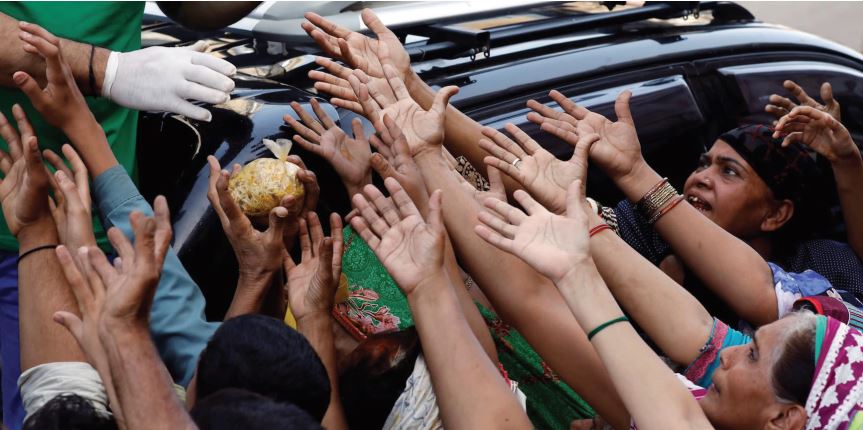A shiny SUV whizzes along the street with a hoard of people running after it.The car stops and a private security guard comes out, holding bags that appear to carry monthly ration. He starts distributing one bag each to people surrounding the car who then shout out their gratitude and prayers. The car starts moving, but two or three people left behind continue to run, shouting and imploring. Two bags are thrown on the street out of the window. A barefoot child pushes others out of the way, and lays his right over the bounty. The car continues its way perhaps in search of more people stricken by poverty relying on favors bestowed upon them by the affluent of society.
Oscar Wilde in his 1891 essay titled, The Soul of Man under Socialism states, ‘… Charity degrades and demoralizes… Charity creates a multitude of sins.’ For Wilde, charity seeks to ‘aggravate the difficulty’ thereby deviating from the final aim which is ‘to try and reconstruct society on such a basis that poverty will be impossible.’ He elaborates his argument by stating that despite the purest of intentions including altruism and benevolence, charity causes more harm than it does good.
The very common scenario in Pakistan portrayed at the beginning of this essay highlights the infinitesimal impact that such acts of charity will have on the lives of the poor. The ration is likely to last not more than a month and evolve into aself-perpetuating cycle. Beyond the impermanence of such gestures, the deeper problem that Wilde alludes to is that it represents a deep injustice in the society. These acts of charity are, for Wilde, also immoral since private property is being used to alleviate evil created by private property in the first place.
These individual acts of charity, witnessed at every traffic signal in Pakistan, in everyday occurrences and interactions between the rich and the poor, bring forward systemic injustice that pervades daily existence in the country. Deeply entrenched within the system, charity exists not only at the individual level, but also at the institutional and state level. Our economy, politics, and society symbolise charity in profound ways.
This begets the question: What is the ethics of charity in Pakistan, with a high poverty rate, and healthcare and education expenditure primarily paid out of pocket? Here, I make a case for and against the ethics of charity.
Making an Ethical Case for Charity
Proponents of charity argue that it is a natural instinct to be responsive to human suffering and failure to do so would corrupt the human soul. Much of charitable donations occur in response to disasters, for example floods and earthquakes.
Australian philosopher and a huge animal rights activist, Peter Singer, frames charitable donations not as acts of ‘charity’ or generosity but rather views them through the lens of ‘duty.’ As he states, ‘if you are living comfortably while others are hungry or dying from easily preventable diseases, and you are doing nothing about it, there is something wrong with your behavior.’ He makes the moral argument that failure to act for others is morally indefensible, particularly if a simple act of charity causes no great harm or suffering to oneself. It should also be noted that Singer does not advocate giving because ‘it is the nice thing to do’ but because it is the right thing to do, something that ought to be done.
Moving beyond duty, philosophers, and contemporary thinkers such as Christine Swanton have also viewed charitable endeavours as ‘the bonds of love and loyalty… The expression of love, solidarity, gratitude to a loved one or to one’s community.’ For Swanton however, charity should be located within a specific community directed to those who are around us, or whom donors have a linkage or relationship with. This of course stands in contrast to Singer’s viewpoint that advocates effective altruism for all at a global scale, irrespective of community or location.
Charity and its motivations cannot be separated from the socio-cultural aspects of a particular region including gender, class, religion as well as race. Lamont (1992), for example, has argued that in the United States, white working-class people primarily donate to charity (among other reasons as well) ‘to give back to the community,’ and not because they are concerned with social justice and solidarity at either the state or global level.
Many of these arguments would apply in the case of Pakistan, a Muslim-majority country that views zakaat as one of the five pillars of faith. The country despite its multiple problems contributes more than 1 per cent of the GDP to charity, which is twice as much as its South Asian counterpart, India and matches high-income countries like Canada and United Kingdom. A survey conducted by Gallup Pakistan during the peak of the Covid-19 pandemic, revealed that more than 80 per cent of the respondents contributed to charity in some fashion, with 40 per cent giving to someone they knew personally. Swanton stands vindicated.
The Gallup survey also revealed that religion served as the most common motivation for giving. This is hardly startling since religion and religious values seep into daily existence of individuals in Pakistan. The scenario described in the essay above is widely witnessed in the month of Ramzan, in which rates of charity are sky-rocketing, comparable to the large number of people in shopping malls preparing excitedly for eid. Islam, of course, is not the only religion that endorses charity. Abrahamic religions including Christianity consider the virtue of charity as the foundation and root of all other virtues.
Against this backdrop, it seems inane to provide moral arguments against charity, an act that has a near universal endorsement by religions and faiths of the world, and that seemingly does so much for the world, in terms of providing for
The Other Side
The Citizens Foundation. Edhi Foundation. HANDS Pakistan. These charities fall under social welfare non-governmental organisations (NGOs). They provide a range of services in Pakistan in the areas of health and education. Without disregarding the huge amounts of service that these organizations have performed for the country since their establishment, I use their names to illustrate a critique of charity through two different perspectives: 1) Systematic Injustice 2) NGO-isation of Resistance by Arundhati Roy (2014).

Wilde, referred to in the beginning of the article, points out some relevant evils that charities create and perpetuate especially pertinent in today’s world. Pictures of starving children in Sudan? Our emotions are tugged, and we feel compelled to reach our pockets and make a quick donation. Many of these acts are done on a case-by-case basis and instead of creating real ripples within the system that can abolish systematic injustice and power imbalances perpetuating societal inequality, these serve as tokenistic efforts, and a way of alleviating one’s guilt of possessing more privilege.
In this vein, many NGOs provide services within the areas of health and education markedly in low and middle-income countries (LMICs). From an economic standpoint, health and education are merit goods that are likely to be under-produced and under-provided but that require encouragement since they contribute to the welfare of society. Therefore, the responsibility lies with the state and government to provide these goods. However, as the number and type of charitable organisations and NGOs (funded through charity as well as international grants and so forth) in Pakistan illustrate, the state has relinquished its responsibility in provision of these services.
For example, the Edhi Ambulance network, while laudable, emerged because of the vacuum that the Sindh government had left in provision of emergency transport services. The Punjab counterpart, Rescue 1122, however was government-initiated and has largely been successful. Within the area of healthcare, the government has nearly given up all its responsibility. Leaving merit goods to operate through philanthropists and charitable organisations may have some benefits in terms of increasing efficiency and cost-cutting but they also have dangerous undertones. This leaves governments with no accountability towards its own people, and certain individuals continue to remain marginalised.
Another haunting aspect is ideological – the impact that receiving charity has on the psyche of those who receive it. Instead of considering health or education as their fundamental right, receiving basic services for free from ‘charities’ or ‘good’ people creates a sense of self-pitied gratitude among the receivers. This in turn leads to lack of self-worth, self-esteem, and a sense of self-mastery. With all our good intentions, we may have ended up creating more harm than good.
Arundhati Roy (2014) considers that the ‘NGO-isation’ does not only absolve state of its responsibility but takes the argument further by stating that the existence of NGOs propagates the neo-liberal agenda. Many NGOs receive international funding from organisations such as the World Bank, the United Nations, and other multinational corporations that seek to liberalise market forces and advocate for massive cut in public spending. NGOs also remain largely accountable to their funding agencies, and ‘not to the people they work amongst.’
Moreover, they employ local people who may have served as activists and agents of change if not tamed by these NGOs. Thereby on an insidious level, NGOs threaten potential emergence of resistance from the grass-root levels. As Roy emphatically points out at the end of her article, ‘Real political resistance offers no such short cuts. The NGO-isation of politics threatens to turn resistance into a well-mannered, reasonable, salaried, 9 to 5 job.’
The Verdict
Not all charity is horrible, or insidious. There are compelling arguments that advocate for charity particularly religious values that motivate virtues of charity and generosity. However, the long-term focus should be on development of sustainable systems that have local representation and voices, and ideally indigenous funding.
Doling out charity that primarily evokes self-righteousness is insufficient, often wasteful, since it does not create long-term impacts. Creation of self-sustainable systems, on the other hand, is likely to seal the deal.
The writer is Assistant Professor at Centre for Bio Ethics and Culture (CBEC), SIUT



